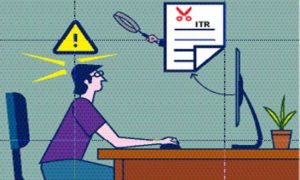The decision of the six-member rate setting panel was announced by the RBI Governor on Wednesday.
The interest rate on home loans is expected to increase as the Reserve Bank of India on Wednesday announced an increase of repo rate by 25 basis points to 6.5 %.
Repo rate is the rate at which the RBI lends money to commercial banks.
Now, banks will have to pay a higher interest to RBI on the loans they take from the central bank. It is expected that the banks will pass the rise to various loans given, including home loans.
“According to the RBI Governor, inflation is likely to stay at 5.6% for 4QFY23, and expected to stay above 4% in FY24. The rate hikes are likely to raise the EMI burden for floating rate linked loans. However, the bank’s NIMs are likely to stay stable as an increasing proportion of EBLR linked loans, said Ajit Kabi, Banking Analyst, LKP Securities.
Read More: After Google, Microsoft And Meta, This Company Plans To SACK 2,000 Employees. Deets Here
For people who have taken loans or who are planning to take, may expect an increase in their EMIs to accommodate the rate hike.
Upasna Bhardwaj, Chief Economist, Kotak Mahindra Bank said, “The MPC delivers a hike in line with our expectations given the need to anchor inflationary expectations. Further the reinforcement of need for action as inflation remains above medium term target of 4% signals the MPCs focus on inflation. Going ahead as inflation begins to moderate we expect real rates to reach near pre pandemic soon and hence the need for incremental rate hikes remain limited. We expect a prolonged pause on rates with a likely shift in stance in the coming April policy.”
Rate hike of 25 bps is considered appropriate at this juncture, monetary policy to remain agile, alert to inflation, Das said.
The RBI had raised the key lending rate by 35 basis points in December, after three straight 50 bps hikes, and had said its fight against inflation was not over yet.
What Should Home Loan Borrowers Do Now?
Increase EMI or Loan Tenure?
To mitigate the impact of rising interest rates, the existing home loan borrowers can either their equated monthly instalments or their loan tenures.
Now, most of the banks prefer to extend the loan tenure while keeping the EMIs fixed. So, if the loan tenure gets extended by 36 months, the interest burden will sharply jump.
Read More: Repo Rate, Plastic Money And MICR: 10 Finance Terms To Improve Your Banking Understanding
Prepayment of Home Loan
To save the rising interest cost, the borrowers can consider prepayment option.
Several banks hiked their repo-linked lending home loan rates post the rate hike announced by RBI in December.
Meanwhile, RBI today projected retail inflation at 6.5% for 2022-23; 5.3% for next fiscal.
It projected GDP growth at 6.4% for 2023-24.
Amid volatile global developments, Indian economy remains resilient, Das said.
The decision of the six-member rate setting panel was announced by the Governor on Wednesday.
With retail inflation showing signs of moderation and remaining below the RBI’s 6% upper tolerance level, and projected slowdown in GDP growth in the next fiscal starting April, experts were of the opinion that the central bank may only opt for a 25 basis points hike in the key interest rate.
RBI Governor Das-headed MPC started its three-day meeting on Monday amid expectations of a smaller 25 basis points rate increase or a pause on the rate hiking spree that started in May last year to check inflation.
Since May last year, the RBI has increased the short-term lending rate by 225 basis points to contain inflation, mostly driven by external factors, especially global supply chain disruption following the Russia-Ukraine war outbreak.
The RBI has been tasked to ensure that retail inflation remains at 4 per cent with a margin of 2 per cent. However, it failed to keep the inflation rate below six per cent for three consecutive quarters beginning January 2022.
However, the retail inflation based on the Consumer Price Index (CPI) has shown signs of moderation in November and December as it fell below the RBI’s upper tolerance level of 6 per cent.
The MPC consists of three RBI officials and three external members appointed by the central government.
The external members are Shashanka Bhide (Honorary Senior Advisor, National Council of Applied Economic Research, Delhi); Ashima Goyal (Emeritus Professor, Indira Gandhi Institute of Development Research, Mumbai); and Jayanth R Varma (Professor, Indian Institute of Management, Ahmedabad).
Apart from the Governor, the RBI officials on the panel are Rajiv Ranjan (Executive Director) and Michael Debabrata Patra (Deputy Governor).
(With inputs from agencies)





































